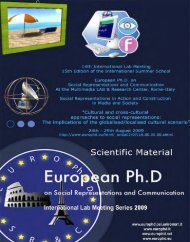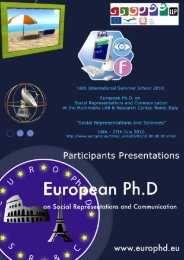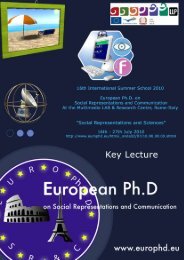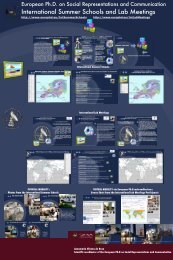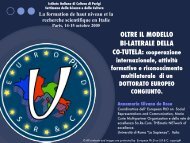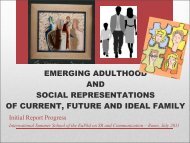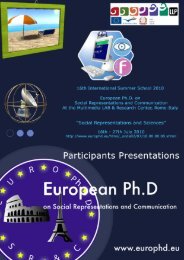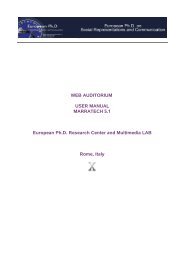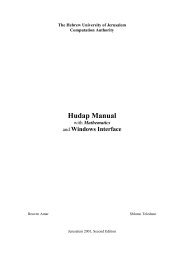The "boomerang" effect of the radicalism in discourse analysis
The "boomerang" effect of the radicalism in discourse analysis
The "boomerang" effect of the radicalism in discourse analysis
Create successful ePaper yourself
Turn your PDF publications into a flip-book with our unique Google optimized e-Paper software.
“How should we deal with <strong>the</strong> fact that our accounts <strong>of</strong> how people’s language use is constructed are<br />
<strong>the</strong>mselves constructions? (…)<br />
It is possible to aknowledge that one’s own language is construct<strong>in</strong>g a version <strong>of</strong> <strong>the</strong> world, while<br />
proceed<strong>in</strong>g with analys<strong>in</strong>g texts and <strong>the</strong>ir implications for people’s social and political lives. In this respect,<br />
<strong>discourse</strong> <strong>analysis</strong>ts are simply more honest than o<strong>the</strong>r researchers, recogniz<strong>in</strong>g <strong>the</strong>ir own work is not<br />
immune from <strong>the</strong> social psychological processes be<strong>in</strong>g studied.”<br />
(Potter & We<strong>the</strong>rell, 1987, p. 182)<br />
<strong>The</strong> practice <strong>of</strong> reflexivity implies not only a meta-<strong>the</strong>oretical glance (namely a<br />
problemis<strong>in</strong>g reflection on one own's <strong>the</strong>oretical op<strong>in</strong>ions and on one's own research<br />
methods <strong>in</strong> comparison with o<strong>the</strong>r options and o<strong>the</strong>r methods), but also a glance <strong>of</strong>, so to<br />
say, meta-<strong>in</strong>stitutional nature (i.e. a reflection on <strong>the</strong> "strategic" role that <strong>the</strong> <strong>the</strong>oreticalmethodological<br />
options perform <strong>in</strong> <strong>the</strong> scientific community, sett<strong>in</strong>g <strong>the</strong> various reference<br />
network one with respect to <strong>the</strong> o<strong>the</strong>r, with<strong>in</strong> a composite series <strong>of</strong> dom<strong>in</strong>ant, dissident and<br />
marg<strong>in</strong>al positions, <strong>in</strong> o<strong>the</strong>r terms that which is def<strong>in</strong>ed "psy-complex" - i.e. “<strong>the</strong><br />
sprawl<strong>in</strong>g speculative and regulative network <strong>of</strong> <strong>the</strong>ories and practice that constitute<br />
psychology” (Ingleby, 1985; Rose, 1985)”. (Parker, 1994, p. 246).<br />
“<strong>The</strong> way that social research is contextualized now will also look a little more complex, for <strong>the</strong><br />
“context” is, <strong>in</strong> this account, not an objective background aga<strong>in</strong>st which <strong>the</strong> researcher renders an account <strong>of</strong><br />
<strong>the</strong> phenomenon <strong>in</strong> question. Ra<strong>the</strong>r, <strong>the</strong> context is <strong>the</strong> network <strong>of</strong> forms <strong>of</strong> subjectivity that place<br />
contradictory demands on <strong>the</strong> research. In social psychological research <strong>the</strong>re is an array <strong>of</strong> competive<br />
<strong>in</strong>terests and agendas that frame <strong>the</strong> production <strong>of</strong> proposals; <strong>the</strong> expectations and demands <strong>of</strong> “subjects” or<br />
co-researchers; and <strong>the</strong> career <strong>in</strong>vestiments and projected autobiographies that exist <strong>in</strong> tension <strong>in</strong> <strong>the</strong><br />
academic world. (...) Among <strong>the</strong> structure that frame <strong>the</strong> experience and reflection <strong>of</strong> <strong>the</strong> researcher are those<br />
<strong>of</strong> <strong>the</strong> psy-complex. If we want to take reflexivity serioulsy, we have to “ground” it <strong>in</strong> <strong>the</strong> <strong>in</strong>stitutional context<br />
<strong>in</strong> which we carry out our research.”<br />
(Parker, 1994, p. 250)<br />
<strong>The</strong> argument <strong>of</strong> tu quoque or <strong>of</strong> <strong>the</strong> reflexivity (application <strong>of</strong> <strong>the</strong> <strong>the</strong>ory to itself)<br />
makes it not only legitimate, but also desirable, that <strong>the</strong> auto-reflective caution should enter<br />
to become part <strong>of</strong> <strong>the</strong> deontology equipment <strong>of</strong> each researcher attentive to <strong>the</strong> problems <strong>of</strong><br />
his specific research contributions (whatever his paradigmatic orientation may be).<br />
Never<strong>the</strong>less doubts are raised regard<strong>in</strong>g <strong>the</strong> way <strong>in</strong> which <strong>the</strong> reflexivity is, <strong>in</strong> fact,<br />
practised <strong>in</strong> <strong>the</strong> scientific community <strong>of</strong> <strong>the</strong> supporters <strong>of</strong> <strong>discourse</strong> <strong>analysis</strong>.<br />
“It would not be helpful, <strong>in</strong> this case, to write <strong>of</strong>f experience as just ano<strong>the</strong>r social construction, or to<br />
reduce <strong>the</strong> expressed dissatisfaction with positivism as a rhetorical trope, discursive position, or warrant. It is<br />
here that <strong>the</strong> political limitations <strong>of</strong> social constructuionist (Gergen, 1985) and some discursive analytic<br />
approach (Edwards and Potter, 1992) become apparent. It is necessary to reflect on <strong>the</strong> structure <strong>of</strong> <strong>the</strong><br />
<strong>in</strong>stitution <strong>of</strong> psychology as it operates now.”<br />
(Parker, 1994, p. 240)<br />
“Reflexivitiy also refers to <strong>the</strong> equal status, with<strong>in</strong> <strong>discourse</strong> <strong>analysis</strong>, <strong>of</strong> researchers and <strong>the</strong>ir<br />
respondents, as well as <strong>the</strong> accounts <strong>of</strong>fered by each. This means that <strong>discourse</strong> analysts must f<strong>in</strong>d a way <strong>of</strong><br />
build<strong>in</strong>g <strong>in</strong>to <strong>the</strong>ir research opportunities for participants to comment upon <strong>the</strong>ir own accounts and those <strong>of</strong><br />
<strong>the</strong> researcher. Sherrard (1991) criticises <strong>discourse</strong> analysts for not always meet<strong>in</strong>g this criterion <strong>in</strong> <strong>the</strong>ir<br />
research.”<br />
(Burr, 1995, p. 181)<br />
It must be recognised that <strong>the</strong> criticisms on this side are jo<strong>in</strong>ed by as many detractors<br />
<strong>of</strong> <strong>discourse</strong> <strong>analysis</strong>, as by <strong>the</strong>ir own exponents (<strong>in</strong>ter-alia: Abrams & Hogg, 1990;<br />
14




